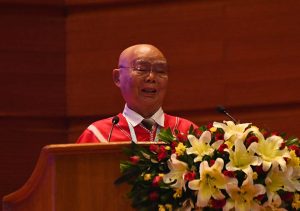29
Esteemed the President of the Republic of the Union of Myanmar, the State Counsellor, the Commander in Chief of Defence Services, senior government officials, senior Tatmadaw officials, leaders of ethnic armed organizations, international dignitaries and the invited guests;
I would like to express my sincere appreciation for an opportunity to represent the ethnic armed organizations who signed the NCA for this opening remark at the 4th anniversary of Nationwide Ceasefire Agreement.
First, I make my best wishes for being healthy and wealthy of all the persons here. It is unfortunate that the members of Restoration Council of Shan State (RCSS) missed this anniversary although we were very hopeful about their participation.
The government of the Republic of the Union of Myanmar and the ethnic armed organizations signed the NCA four years ago. However, I understand the increasing grudge, doubt, worry and hatred are disturbing the significant development in implementing NCA. We need to review the reason for mistrust, and we need to hold political dialogues based on justice and fairness in implementing peace process.
An objective of NCA is to end armed conflicts which broke out since the country has regained its independence, and to make a lasting peace through peaceful political negotiations.
The NCA was first signed by the eight ethnic armed organizations. The Mon New State Party (MNSP) and the Lahu Democratic Union (LDU) formally signed the NCA on 13 February 2018, making the 10 signatories in the NCA.
Attempts of government, the Tatmadaw and the NCA signatories have not succeed yet to persuade the remaining ethnic armed organizations to sign the ceasefire deal.
We need to discuss this situation. Only then, the reality of NCA could be captured. Political dialogues could produce expected results for the emergence of a federal union.
Although we tried for the objectives of NCA for four years, we have not made common interpretations on the terms of NCA. Instead, implementations of NCA were based on the view of individuals.
Some of the ethnic armed organizations have remarked that the peace process is deviating from the expected way, although it might not be a common view and opinion of all the stakeholders. It can be concluded that mistrust, concerns, extremism and desire to gain the upper hand are disturbing political dialogue and peace-making process.
However, we need to make progress in peace process. We need to hold mutual respect among each other for effective cooperation. It is very important to build up a trust among the stakeholders in peace making process. Transparency is also essential for trust-building process. Moreover, all the stakeholders need to make common understanding and common objectives to overcome the existing disturbances and challenges in finding ways for peace and the ultimate goal of establishing a democracy federal union.
We need to consistently implement the basic principles of NCA that include a paragraph to establish a union based on the principles of democracy and federalism in accordance with the outcomes of political dialogue and in the spirit of Panglong, that fully guarantees democratic rights, national equality and the right to self-determination on the basis of liberty, equality and justice while upholding the principles of non-disintegration of the union, non-disintegration of national solidarity and perpetuation of national sovereignty.
In conclusion, I suggest all the signatories of NCA to implement this agreement based on responsibility and accountability for lasting peace. I also recommend all the stakeholders to build trust and hold mutual respect among each other in developing a democracy federal union.
MNA (Translated by Aung Khin)


